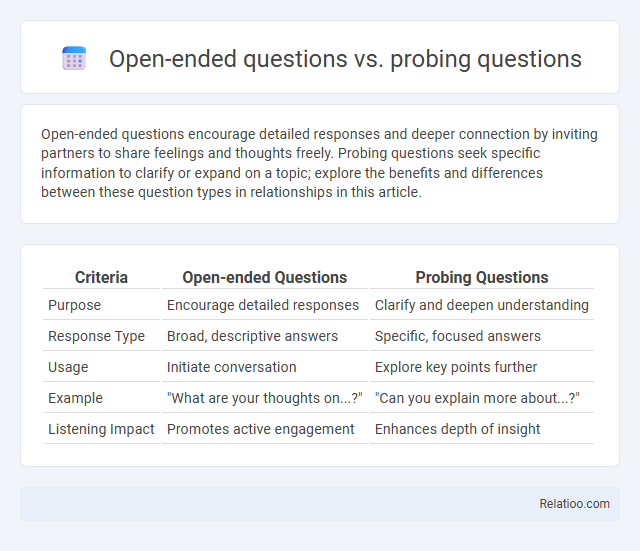Open-ended questions encourage detailed responses and deeper connection by inviting partners to share feelings and thoughts freely. Probing questions seek specific information to clarify or expand on a topic; explore the benefits and differences between these question types in relationships in this article.
Table of Comparison
| Criteria | Open-ended Questions | Probing Questions |
|---|---|---|
| Purpose | Encourage detailed responses | Clarify and deepen understanding |
| Response Type | Broad, descriptive answers | Specific, focused answers |
| Usage | Initiate conversation | Explore key points further |
| Example | "What are your thoughts on...?" | "Can you explain more about...?" |
| Listening Impact | Promotes active engagement | Enhances depth of insight |
Introduction to Questioning Techniques
Open-ended questions invite detailed responses and encourage expansive thinking, fostering in-depth conversations during interviews or counseling sessions. Probing questions delve deeper into specific topics, clarifying and expanding initial answers to uncover underlying feelings or information. Understanding the distinction between these questioning techniques enhances communication effectiveness by guiding discussions strategically and eliciting comprehensive insights.
Defining Open-Ended Questions
Open-ended questions encourage Your detailed responses by allowing for elaboration and explanation, unlike probing questions that dig deeper into specific areas. Defining open-ended questions involves recognizing their role in fostering free-flowing dialogue and gaining comprehensive insights. These questions start with "how," "why," or "what" to stimulate thoughtful answers and explore perspectives thoroughly.
Understanding Probing Questions
Probing questions are designed to delve deeper into a topic, extracting detailed information beyond initial responses by encouraging critical thinking and elaboration. Unlike open-ended questions that invite broad answers, probing questions target specific aspects of your response to clarify, expand, or challenge ideas for better understanding. Mastering probing questions enhances your ability to uncover underlying motives, attitudes, and insights during conversations or interviews.
Key Differences Between Open-Ended and Probing Questions
Open-ended questions invite expansive responses by encouraging detailed explanations, often starting with "how" or "why," fostering broad conversation and insight. Probing questions dig deeper into specific aspects of a topic, used to clarify, challenge, or expand on initial responses, extracting more precise or detailed information. The key difference lies in scope: open-ended questions initiate discussion with general inquiry, while probing questions follow up to explore nuances within those initial answers.
Benefits of Using Open-Ended Questions
Open-ended questions encourage detailed responses, allowing you to gather richer information and deeper insights from conversations. Unlike probing questions, which seek specific clarifications, open-ended questions foster creativity and critical thinking, leading to more meaningful dialogue. Using open-ended questions in your interactions enhances engagement and uncovers perspectives that closed or probing questions might overlook.
Advantages of Probing Questions
Probing questions offer distinct advantages by encouraging deeper analysis and clarification beyond your initial response, enhancing understanding in conversations or interviews. They help uncover underlying motives, feelings, or assumptions, making them essential for gathering comprehensive information and fostering meaningful dialogue. Probing questions also enable you to address ambiguities and explore specific aspects without limiting the scope of the discussion.
Situations Best Suited for Open-Ended Questions
Open-ended questions are best suited for situations where you need to explore thoughts, feelings, and detailed responses, such as in interviews, counseling, or brainstorming sessions. These questions encourage elaboration and provide insight into your respondents' perspectives, unlike probing questions, which aim to clarify or deepen specific answers already given. Using open-ended questions effectively can foster richer communication and reveal information that may not surface through closed or probing inquiries.
Scenarios Where Probing Questions Excel
Probing questions excel in scenarios where deeper insights are required beyond initial responses, such as during customer feedback analysis, job interviews, or counseling sessions. They enable you to uncover underlying motivations, clarify ambiguous statements, and explore complex issues by encouraging detailed explanations. Unlike open-ended questions that invite broad responses, probing questions target specific areas, enhancing the quality and depth of your understanding.
Common Pitfalls in Questioning Methods
Open-ended questions encourage expansive responses but can lead to vague or unfocused answers if not carefully crafted, while probing questions dig deeper into specific points but risk making the respondent feel interrogated. Common pitfalls include asking overly broad open-ended questions that overwhelm your audience and relying too heavily on probing questions that disrupt the natural flow of conversation. Your goal should be to balance both by using open-ended questions to explore ideas broadly and probing questions strategically to clarify or expand on key details.
Best Practices for Effective Questioning
Effective questioning involves distinguishing open-ended questions, which encourage expansive, detailed responses, from probing questions that delve deeper into specific aspects of the initial answers to clarify or elaborate. Best practices for effective questioning include using open-ended questions to explore broader topics and follow with probing questions strategically to uncover insights, ensuring Your dialogue remains dynamic and informative. Balancing these techniques fosters deeper understanding and more meaningful engagement in conversations.

Infographic: Open-ended questions vs Probing questions
 relatioo.com
relatioo.com